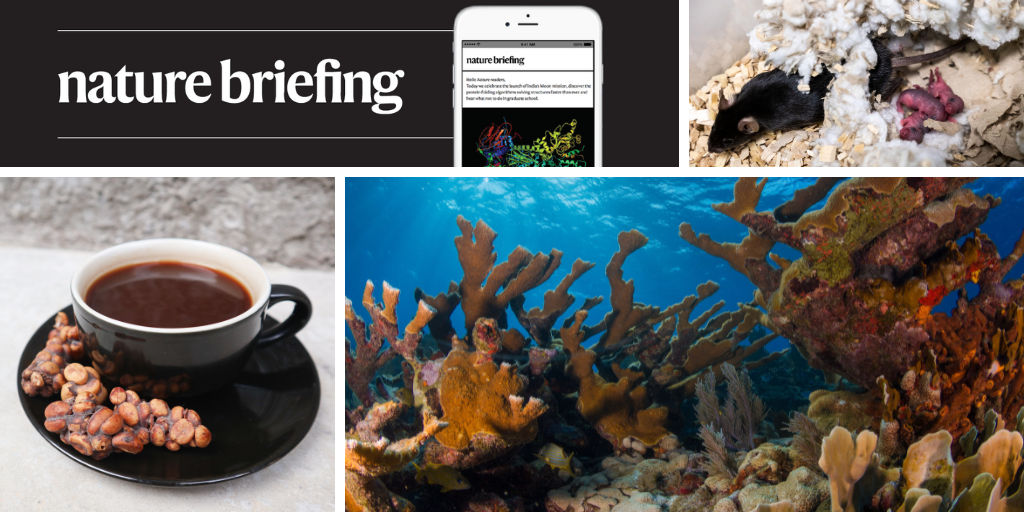You have full access to this article via your institution.
Hello Nature readers, would you like to get this Briefing in your inbox free every day? Sign up here.

When civet cats eat coffee beans, they excrete them in clumps (shown) that can later be processed to make a pricey drink.Credit: Faiz Dila/Getty
Two fatty acids often used in dairy products might help to give civet coffee its distinctive flavour. The unusual brew, otherwise known as Kopi Luwak, is made by roasting coffee beans that have been eaten and excreted by Asian palm civets (Paradoxurus hermaphroditus). Researchers found that these fatty acids appeared at a higher concentration in beans taken from civet faeces than in those taken directly from the plant. This difference is probably caused by fermentation in the civet guts, with Gluconobacter gut bacteria and their enzymes playing a key part, the team says.
Reference: Scientific Reports paper
Two iconic corals that have flourished across Florida’s 560-kilometre-long reef for more than 10,000 years are now ‘functionally extinct’ following the record-breaking 2023 heatwave. A few elkhorn coral (Acropora palmata) and staghorn coral (Acropora cervicornis) survive in tanks and scattered in the wild, but a new study suggests that so few remain they can no longer act as the primary reef builders in the area. Scientists say that conservation efforts that focused primarily on re-seeding the corals from lab-grown nubs must now shift towards trying to breed or develop heat-resistant strains of Acropora corals from the few that survived, or to other, more heat-tolerant species altogether. Ultimately, “none of this will matter if we don’t address the root of the problem”, notes coral biologist and study co-author Ross Cunning: greenhouse gas emissions from burning fossil fuels.
Reference: Science paper
An artificial intelligence (AI) model trained on complex data from human cells could bypass the need for time-consuming drug-screening in the race to develop new medicines. The model, called DrugReflector, was trained on data about how each of nearly 9,600 chemical compounds perturbs gene activity in more than 50 kinds of cell. Researchers found that DrugReflector was up to 17 times more effective at finding compounds that could affect the generation of certain blood cells than standard screening, which depends on randomly selecting compounds from a chemical library.
Question of the week
What’s the best science-themed gift you’ve ever received? Mine was a book called The Physics of Star Trek — I felt seen. Maybe yours was a present that inspired you to become a scientist, or a thoughtful gift from a colleague that holds particular meaning. Let us know at [email protected].
Features & opinion
The first known fossils of Homo erectus — once called ‘Java Man’ — were excavated by Dutch physician and naturalist, Eugène Dubois, using Javanese forced labourers on the island of Java in Indonesia. He then brought the find back to the Netherlands, where it remained for 130 years despite several diplomatic efforts. Now it, along with 28,000 more fossils taken by Dubois, is heading home. “The pieces were part of our identity and highlight of our museum collection,” says Bart Braun of the Naturalis Biodiversity Center, where the material has been for more than a century. “But we realize this is a very important moment for Indonesians, as it corrects a past injustice.”
National Geographic | 7 min read
Brazil “shows how better policy can make a difference” when it comes to defending rainforests, argues an editorial in The Economist. As we approach the United Nations climate conference, COP30, starting next month in Brazil, the editorial explores how the country’s “judicious mix of stick and carrot” can offer lessons to the world. But the overarching challenge remains: how should countries be recompensed for protecting the lungs of the planet? “Somehow, the world has to find a way to make conservation pay.”
The Economist | 4 min read (free reg required)
A prospective renter watches a bidding war play out in an unexpected fashion in Here there be and a widower has his treatment altered without his consent in Paper or plastic?
Nature | 6 min read & Nature | 6 min read
Researchers have uncovered how hunger and hormones cause aggressive behaviour in mice — including attacking young pups, potentially as a food source (the scientists stepped in as soon as the mice showed this behaviour). The finding could help researchers understand more about how multiple stimuli are interpreted by the brain, something much harder to study than single-stimulus effects.
Nature Podcast | 34 min listen
Subscribe to the Nature Podcast on Apple Podcasts, Spotify or YouTube Music, or use the RSS feed.
There’s no penguin-search puzzle this week, because Leif Penguinson is making a cameo on the cover of Nature Sustainability (and Briefing photo editor and penguin wrangler Tom Houghton is on holiday). Back next week!
This newsletter is always evolving — tell us what you think! Please send your feedback to [email protected].
Thanks for reading,
Flora Graham, senior editor, Nature Briefing
With contributions by Jacob Smith
• Nature Briefing: Careers — insights, advice and award-winning journalism to help you optimize your working life
• Nature Briefing: Microbiology — the most abundant living entities on our planet — microorganisms — and the role they play in health, the environment and food systems
• Nature Briefing: Anthropocene — climate change, biodiversity, sustainability and geoengineering
• Nature Briefing: AI & Robotics — 100% written by humans, of course
• Nature Briefing: Cancer — a weekly newsletter written with cancer researchers in mind
• Nature Briefing: Translational Research — covers biotechnology, drug discovery and pharma


